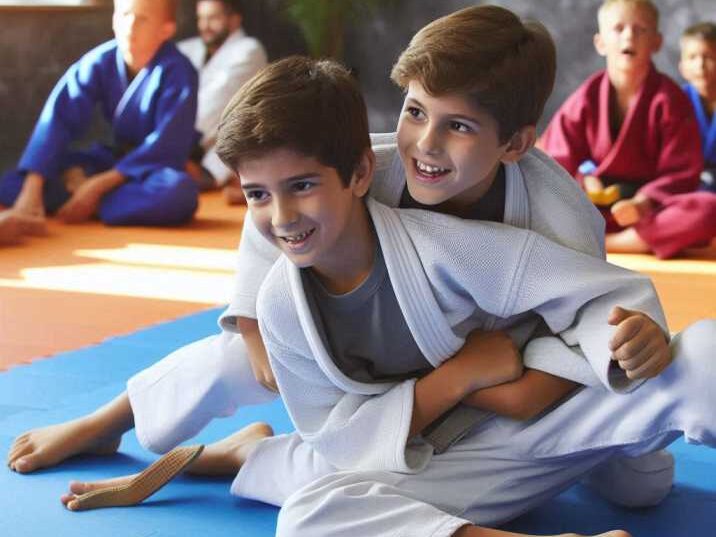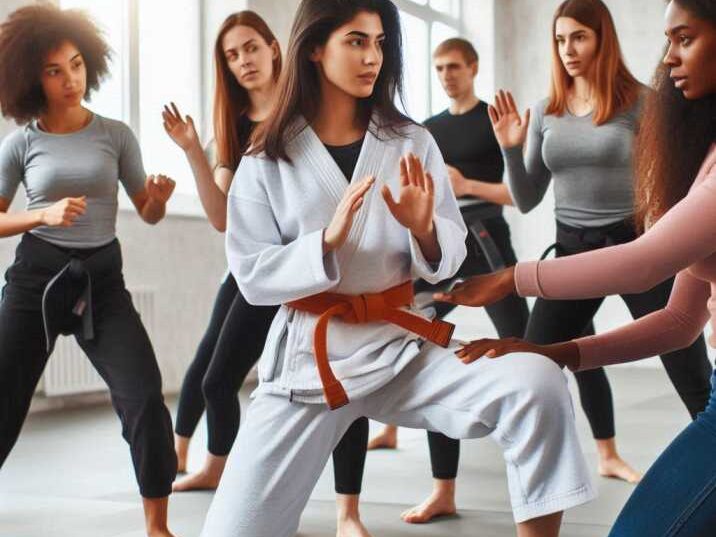Introduction
Table of Contents
Have you ever wondered what to do if someone tries to hurt you or take your stuff? That’s where self-defense comes in. Jiu Jitsu, a martial art from Brazil, is one of the best ways to learn how to protect yourself without using punches or kicks. It teaches people how to stay calm, think smart, and stop a fight without being mean.
In this article, we’ll explore how Jiu Jitsu and Self-Defense works, builds confidence, improves focus in school, and teaches life lessons that last forever.

What is Jiu Jitsu?
A Gentle Martial Art
Jiu Jitsu, also called Brazilian Jiu Jitsu (BJJ), is a martial art that focuses on grappling and ground fighting. That means it’s all about using your body smartly, not violently. Instead of hitting, you use moves like holds, escapes, and submissions to control a situation.
History of Brazilian Jiu Jitsu
BJJ was created in Brazil in the early 1900s. It comes from Judo, a Japanese martial art. The Gracie family in Brazil helped make Jiu Jitsu famous around the world. Today, millions of people of all ages train in BJJ to stay fit and learn how to defend themselves.
Why Jiu Jitsu is Great for Self-Defense
1. Real-Life Situations
Jiu Jitsu is perfect for real-life self-defense. Most fights end up on the ground, and that’s where Jiu Jitsu shines. It teaches you how to escape grabs, defend against attackers, and control the fight without getting hurt.
2. No Need to Be Big or Strong
One of the best parts? You don’t have to be tall or strong to do well in Jiu Jitsu. It’s all about leverage, technique, and smart thinking. Even small kids can use it to defend themselves.
3. Stay Calm Under Pressure
BJJ teaches you how to stay cool when things get scary. You learn to breathe, think clearly, and make good choices, which is super helpful if someone tries to start a fight.
Jiu Jitsu Improves Focus and Discipline
Focus in School and Life
Training in Jiu Jitsu requires concentration. You need to learn step-by-step techniques, pay attention to your partner, and listen to your coach. This helps kids do better in school and other activities like sports or music.
Discipline and Respect
Jiu Jitsu teaches respect for others. Students bow when they enter the gym, shake hands with partners, and help each other learn. This builds strong discipline and teamwork skills.
Key Self-Defense Techniques in Jiu Jitsu
| Technique Name | What It Does | Helpful For |
|---|---|---|
| Shrimping | Helps escape from someone sitting on top of you | Ground escapes |
| Guard Position | Protects you while on your back | Defense from attacks |
| Mount Escape | Gets someone off your chest | Breaking free from control |
| Triangle Choke | Uses legs to control opponent’s neck | Submission hold |
| Armbar | Bends arm to make someone tap out | Control without hurting |
👧🏽 Jiu Jitsu for Kids and Teens
Builds Confidence
Kids who train in Jiu Jitsu become more confident. They know how to protect themselves and don’t feel scared walking home from school or dealing with bullies.
Anti-Bullying Power
Jiu Jitsu teaches kids to use their voice, stay calm, and only use skills when truly needed. It’s about being safe, not being a fighter.
Self-Defense for Women
Women around the world are turning to Jiu Jitsu for personal safety. It gives them the ability to defend against bigger or stronger attackers. Jiu Jitsu is all about technique, not size or power, making it ideal for self-defense situations.

🏋️ Physical Benefits of Jiu Jitsu
Builds strength and stamina
Jiu Jitsu uses your whole body, helping you build strong muscles and better endurance. Over time, your body becomes stronger and can handle more physical activity without getting tired.
Improves balance and coordination
Practicing Jiu Jitsu teaches you how to move your body smoothly and stay steady. It helps you become more aware of your body and improves how you control it during quick movements or tricky positions.
Helps with weight management
Since Jiu Jitsu is a full-body workout, it burns lots of calories. Training regularly can help kids and adults stay at a healthy weight in a fun and active way.
Boosts heart health
Jiu Jitsu keeps your heart beating faster, which makes it stronger. It’s a great way to improve your cardiovascular health and increase overall energy levels.
Encourages healthy lifestyle habits
People who train in Jiu Jitsu often start eating better, sleeping more, and avoiding bad habits. Being part of a martial arts community also supports making healthy choices every day.
🌟 Mental Benefits of Training
Builds self-esteem
Learning new moves and earning belts in Jiu Jitsu helps boost confidence. Every achievement, big or small, makes students feel proud of themselves.
Teaches goal setting
Jiu Jitsu has a clear path of progress through belt levels and skills. This helps kids and adults learn how to set goals and work hard to reach them step by step.
Reduces anxiety
Training gives your mind a break from daily stress. The focus and physical movement help calm your thoughts and make you feel more relaxed and in control.
Promotes positive mindset
Jiu Jitsu teaches you to stay calm, be respectful, and keep trying even when it’s tough. These habits help you think in a positive way both on and off the mat.
Teaches problem-solving under pressure
In sparring or drills, you must think quickly and make smart moves. Jiu Jitsu helps your brain learn how to solve problems calmly, even when the pressure is on.
🏠 Can You Use Jiu Jitsu Outside the Gym?
Yes! Jiu Jitsu is designed for real-world use. But students also learn when not to fight. It’s more important to walk away or ask an adult for help than to start a fight.
🧩 How Often Should You Train?
Most kids train 2–3 times per week. That’s enough to learn, improve, and still have time for homework and play. The more you practice, the better your self-defense skills get!
🎓 What You Learn Stays Forever
Even if you stop training, the lessons you learn from Jiu Jitsu—confidence, respect, focus, and calm thinking—stay with you for life.
🧠 Conclusion: Jiu Jitsu is Smart Self-Defense
Whether you’re a kid, a teen, or an adult, Jiu Jitsu is a powerful tool for self-defense. It helps you stay safe, get strong, and grow in confidence. Best of all, it teaches you how to stay calm, stay kind, and make good choices in tough situations.
If you want to feel strong inside and out, Jiu Jitsu might be the perfect place to start.
FAQs About Jiu Jitsu and Self-Defense
1. Is Jiu Jitsu good for self-defense?
Yes! It teaches you how to protect yourself without hurting others.
2. Can kids learn Jiu Jitsu?
Absolutely! Kids as young as 4 can start learning safely.
3. Do you need to be strong to do Jiu Jitsu?
No. Jiu Jitsu uses technique and leverage, not strength.
4. Is Jiu Jitsu better than Karate for self-defense?
Jiu Jitsu is great for close contact and ground defense, while Karate focuses more on strikes. Both can help, but Jiu Jitsu is better for real-life situations.
5. How long does it take to get good at Jiu Jitsu?
Most students feel more confident after just a few months of training.

